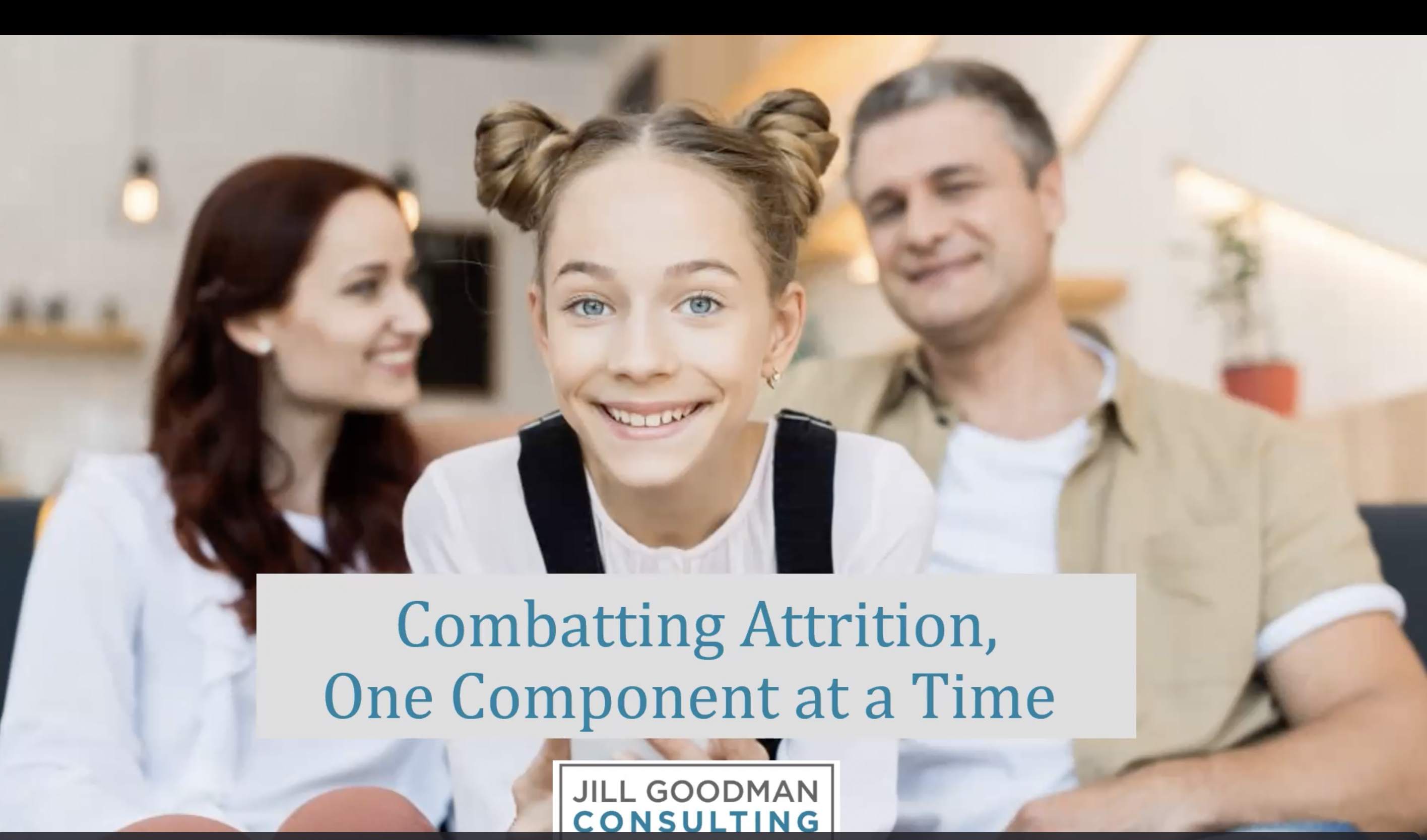Webinar Recap: The Six Components of Parent Retention

Everyone working in summer and after school programs wants to meet the needs of parents and students to create a great experience for the family. Parental retention—ensuring parents are happy with the program and want to keep their child enrolled—is of fundamental concern to auxiliary program leaders.
In her webinar Decoding Attrition: The Six Components of Parental Retention, Jill Goodman of Jill Goodman Consulting stated that parent attrition happens when parents experience a disconnect between what they expect from a program and what they experience. To help us conceptualize parents' concerns, she offered this chart:

Phase 1: When you initially meet with parents, their biggest concern is whether your program can meet their family’s needs.
Phase 2: After parents know about your program and have decided it is financially feasible for them, they are most concerned that this is the right program for them--the one that will solve their problem.
Phase 3: When parents have decided to enroll, they become most concerned about risk: will it deliver on its promises? Will it be worth the investment? Will it be a great experience for their child?
Parents need continual reassurance that they've made the right choice, and communication throughout a child’s enrollment in an auxiliary program is crucial. Goodman outlined six key components that must be addressed to maximize parent retention.
1. Seamless Transfer Out of Admissions Office: Offer clear communication about how the program works after the student is enrolled and before the program begins.
After the initial excitement of enrollment, parents often perceive a lack of communication about how the program will function and what they need to do. Clearly addressing questions--how meal plans work, when does drop off/pick up happen, etc.--helps reinforce to parents that they made the right decision in choosing your program. Consider meeting with families or even hosting your own focus groups to find out what their main concerns are.
2. Brand Promise Communication Feedback Loop: Deliver on what you promise and tell parents about it.
Reassure parents that the program is working as advertised. Remind them of how you are meeting their needs by offering evidence that you're keeping the promises made during the admissions process. Check for any potential disconnect between what you advertise and what happens when their child enrolls.
3. Clear Internal Marketing: Understand parents' concerns and questions and how they change over time.
Let parents know that your program is still the best choice for their child. Make sure you understand what their concerns truly are. Do they have anxieties arising from rumors or gossip? How can you get ahead of rumors to make sure their worries are addressed? Remind parents that you're on top of their concerns and are actively solving any problems.
4. Public Displays of Learning: Let students shine within their community.
Parents love to see evidence of what their child has learned. They feel more bonded with a program when they observe them thriving and engaging with their community. Consider hosting arts shows, skits, or recitals that allow parents to see their kids in action and to meet and mingle with other parents. Offer a virtual option so they can participate in whatever way works for them.
5. Swift and Effective Conflict Resolution: Learn the root of parents' anxieties.
When conflict arises, parents need to know whom they can talk to about their concerns. Parent attrition can occur when communication breaks down, and everything they hear about your program may be from one unhappy incident or from rumors or gossip. Consider hiring someone in charge of camper care. When concerns arise about a student’s allergies, fears, or any special needs, parents know they can contact this specialized staff member rather than a CIT or other less experienced counselor. Evidence shows that hiring a staff member dedicated to camper care significantly increases retention rates.
6. Is This My Community? Be intentional about creating parent community.
Parents choose an auxiliary program as much for community as for academic excellence or financial feasibility. If parents feel they belong and are supported, they are more likely to stay with the program. They're also more likely to come forward with concerns and allow more time for conflicts to resolve. If parents don’t feel this sense of belonging, they may create their own groups to find community, leading to an emotional disconnect from the program itself.

Evaluate how your program works to ensure parent retention. Do you need someone dedicated to camper care? Could you do more to reassure parents that you're delivering on the promises made in the admissions process? Do parents feel they belong to a vibrant and engaged community? Making intentional changes could lead to greater parental satisfaction and better retention rates for your summer and after school programs.
